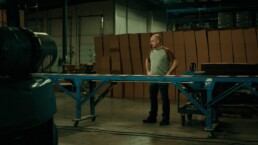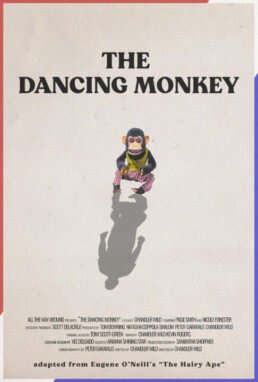‘The Dancing Monkey’ Review: The Working Class Takes on the Industrial World
A timely, thought-provoking feature that encourages audiences to keep an open mind.
With the Presidential election just over 30 days away comes the relentless campaigning and heated debates between the left and right, each steadfast in the opinion that their view is the right one. However, most people would argue that the answers to these many issues are rarely black or white. When real lives are at stake, finding common ground can feel like a myriad of greyness that, at times, is hard to make sense of. This all-too-common political murkiness is dramatically displayed in writer/director Chandler Wild‘s The Dancing Monkey. Adapted from Eugene O’Neill’s groundbreaking play ‘The Hairy Ape’, The Dancing Monkey is a timely feature film that encourages audiences to keep an open mind and try to approach these pending political issues from all sides.
One Man and One Vote Can Change the Future
The film takes place in middle America where most residents are proud blue-collar workers. Wayne Hughes (Paige Smith) is a man in his late 40s who has been employed at a cardboard construction factory for many years. He becomes entangled in a life-changing political crisis when his fellow linemen vote to unionize ahead of leadership’s decision to cut 90% of jobs. The introduction of automated machines at the cardboard factory will deem most workers expendable, as well as having the increased efficiency to now compete with overseas companies. As luck, or misfortune, would have it, Wayne’s sole vote is the deciding factor in whether or not a union will be formed.
The film plays out over one day, where Wayne is inundated with pleas from both sides of the aisle. He hears the pros and cons of unionizing from capitalists, democratic liberals, and socialists. They share compelling yet conflicting information that causes Wayne to grow even more confused as to how he will cast his vote. Throughout Wayne’s overwhelming discourse, he continues to flash back to an image of a young man passed out on the floor. Who this man is remains a mystery until the film’s end, when we discover that it is his recently deceased son who fell victim to another rampant American issue: a drug overdose.
The Working Class Takes on the Industrial World in This Timely Feature
The Dancing Monkey confronts uncomfortable but necessary topics that wade into the moral and ethical implications of voting for or against certain issues. Wayne is a proud American who believes his contribution as a lineman is worth far more than substituting him for a machine. “These boxes are what makes this country great,” and “We built this country” are just a couple of the lines he enthusiastically repeats throughout the film. Filmmaker Chandler Wild does a terrific job taking nebulous and often hard-to-understand concepts and turning them into easily digestible scenes. As for the performances, Paige Smith is a commanding presence who serves as a sympathetic symbol for the working class.
The film’s title comes from an insult by one of the women in leadership toward Wayne and his co-workers. When discussing the future of factory workers compared to the imminent industrial evolution, she claims that workers are akin to dancing monkeys, doing what they’re told repeatedly without thought or agency. Although this line of thinking feels archaic and belittling, it may not be–as we see in the film–not very different from people’s way of thinking.
Takeaway
The Dancing Monkey is a powerful character study of the present. It confronts the realities of being a working-class person in America and will most likely appeal to the old guard who are frustrated with the status quo. It’s a timely, thought-provoking watch that is available to stream on VOD now.
Morgan Rojas
Certified fresh. For disclosure purposes, Morgan currently runs PR at PRETTYBIRD and Ventureland.


